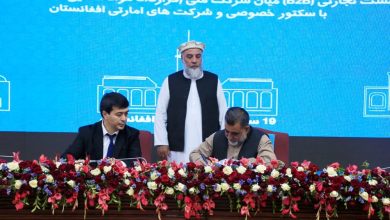Resumption of CASA-1000 Project in Afghanistan; Brishna Commits to Completion in Two Years
Brishna Company announced that the CASA-1000 project, previously halted in Afghanistan for unspecified reasons, has resumed. The company stated that work on the first phase has begun by the contracted company, with activities on the second and third phases set to start soon.
The head of Brishna Company emphasized its commitment to implementing the CASA-1000 project in Afghanistan, with completion expected within one and a half to two years.
Abdul Bari Omar, head of Brishna Company, said: “This is a foreign company, and it has committed to starting work on the second and third phases in the country within a month. Another piece of news is that since the Islamic Emirate came to power, significant efforts have been made to restart this project, and thankfully, work has been progressing rapidly for the past six months.”
Omar noted that during his visit to Tajikistan, he met and held discussions with officials from Pakistan, Tajikistan, and Kyrgyzstan. The main focus of these talks was addressing existing challenges to the project, accelerating its implementation, and reviewing the costs of completion.
The head of Brishna Company added: “The remaining work on the CASA-1000 project will begin soon, and the ongoing work will gain momentum. Efforts are being made to complete and commission the project within one and a half to two years.”
Given the severe energy shortages in South Asian countries, Central Asian nations are striving to transfer infrastructure projects, including energy, through Afghanistan to this region.
The CASA-1000 project is one of the most significant energy transmission initiatives, transferring electricity from Kyrgyzstan through Tajikistan and Afghanistan to Pakistan.
Ahmad Fardous Behzad, an economic analyst, views the completion of this project as beneficial for addressing Afghanistan’s electricity shortages and creating employment opportunities.
He said: “To the extent that this project is implemented within Afghanistan, we can benefit from transit revenues and job creation, as it requires a workforce. If we can complete these projects efficiently, Afghanistan can gain greater benefits.”
Through the CASA-1000 project, Kyrgyzstan will transmit 1,000 megawatts of electricity via Tajikistan and Afghanistan to Pakistan. In addition to receiving electricity, Afghanistan is expected to earn $45 to $50 million in transit fees from this project.




